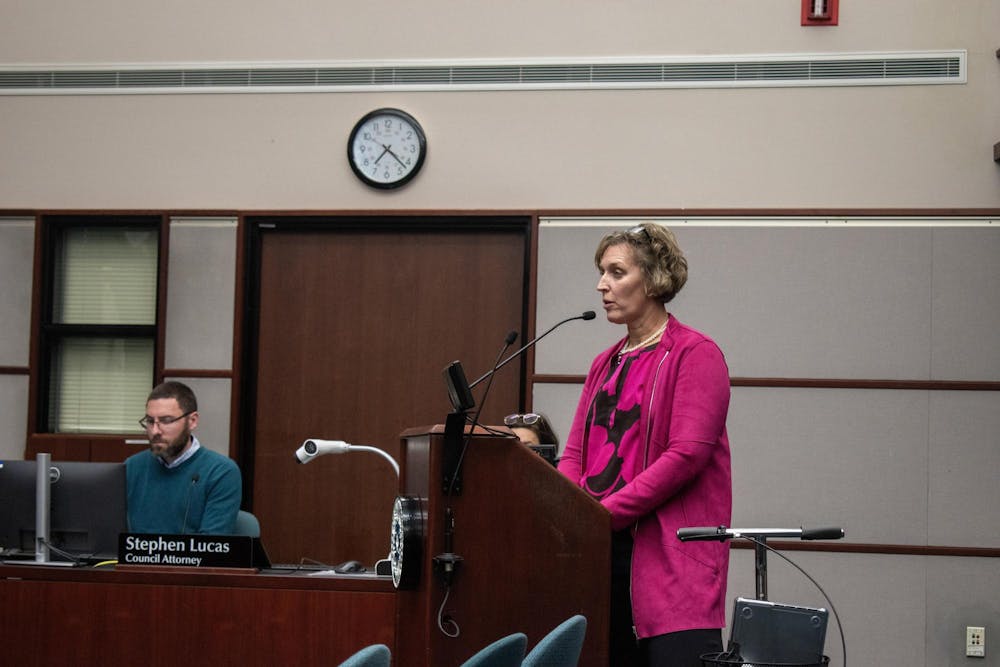Tensions between Bloomington City Council and the mayor’s office continue to rise after the council’s meeting Wednesday.
Mayor Kerry Thomson proposed an appointment to fill a vacancy on the Historic Preservation Commission prior to the council’s Oct. 16 meeting. The city council must approve the mayor’s appointment before they take office.
The council neglected to discuss the appointment at that meeting, though they could have held a vote.
Thomson emailed the nine members of city council Oct. 19, criticizing the council accusing them of “intentionally avoiding public discussion.”
She also mentioned in the email that a male councilmember had called her 10 minutes before the Oct. 16 meeting asking to table consideration of her appointment, suggesting a vote on the issue would end unfavorably for the mayor.
On Nov. 6, Thomson took the podium during city council to inform the council members that her HPC appointment had withdrawn from consideration.
“I selected as my appointment the only non-white male that had applied to the HPC,” Thomson said. “Unfortunately, my original appointment, and the only candidate of any diversity, no longer wishes to be considered for this volunteer position, as the initial appointment process was unwelcoming.”
This Wednesday, councilmember Hopi Stosberg used her report time to respond to Thomson’s comments from Nov. 6.
“Checking a demographic box is not a qualification for serving on the HPC,” Stosberg said. “Furthermore, simply because someone happens to check the box ‘white male’ should not immediately disqualify them from any position.”
Stosberg said that looking at demographics over qualifications results in “unqualified” people holding positions of power.
She finished by saying that when she reviewed the applicants for the HPC vacancy, there were “white males” who were “qualified” for the position. She again said they should not have been disqualified from consideration based on their demographic.
Though Thomson campaigned for “collaborative government” in her Oct. 19 email, the council and mayor’s office have been at odds lately.
Deputy mayor Gretchen Knapp seemingly accused councilmembers Matt Flaherty and Kate Rosenbarger of having a vested interest in planning and transportation employees’ salaries during discussion of the department Oct. 30.
“I have to point out for the benefit of the public that one reason, perhaps, why councilmember Rosenbarger is so interested in this department is that her sister was the former assistant director until a few months ago, and that person was also councilmember Flaherty’s wife,” Knapp said.
Flaherty came to the Nov. 6 meeting with prepared points addressing Knapp’s words. He suggested the council’s code of decorum, Robert’s Rules, be invoked against Knapp.
Robert’s Rules include rules for proceedings that dictate the way council members speak to each other. Flaherty’s wish to apply Robert’s Rules to Knapp’s comments would extend the rules of decorum to public commenters, which could impede the public’s First Amendment rights.
Regarding cooperation between the city council and mayoral administration, Stosberg said the legislative and executive branches of city government are divided “for a reason.”
“They are two branches of government that are supposed to check and balance each other,” she said. “We are supposed to make sure to the best of our ability that the other branch is not overreaching. We should constantly be questioning each other, and questioning is not necessarily a sign of disagreement.”
Stosberg stressed that the legislative and executive branches will not always share the same views.
“Our job is not to rubber stamp the mayoral administration,” Stosberg said. “Perhaps we need to remind ourselves that it’s not personal, it’s business.”
The council will meet again Dec. 4.




